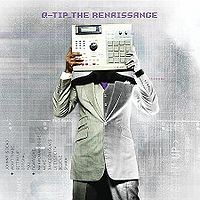Jonathan Davis, known as Q-Tip and, most importantly, as the key member of the legendary group A Tribe Called Quest, has had one hell of a rocky solo career.
When A Tribe Called Quest disbanded in 1998, Q-Tip immediately pursued a solo career, releasing Amplified in 1999 and selling over half a million records. In 2002, Q-Tip completely finished his experimental followup titled Kamaal the Abstract when the record label decided to shelve the album because it was too "uncommercial." The tracks leaked and are available on file-sharing networks, but the label retains the rights to the music and Q-Tip has still been unable to release the music. Fast-forward a few years and Q-Tip finally releases his second solo album, titled The Renaissance.
For those of you unfamiliar with A Tribe Called Quest, they were a critically acclaimed and successful hip-hop group in the 1990s. Heavily influenced by jazz and, later, electronic beats, A Tribe Called Quest offered an alternative to the G-funk gangsta rap of the era that was introduced by the likes of Dr. Dre and Snoop Dogg.
On The Renaissance, Q-Tip carries on with this spirit of positive hip-hop music. The lyrics on this album are not political, and they're not "socially conscious" (one of the most over-used terms in hip hop). Most of the songs are uplifting love songs. Q-Tip is older now; he's been rapping since 1988 and 20 years later, he's released a relaxing, soothing record that he can relate to as a rapper nearing age 40.
The beats on the record -- all of which were produced by Q-Tip, with the exception of a track by the late J Dilla -- are atmospheric, silky and polished. Q-Tip's fluid and smooth rapping style matches the aqueous grooves of the album perfectly, offering the listener a relaxing record. The highlight of the album is the J Dilla song "Move," which unexpectedly switches beats halfway through the song. Q-Tip's collaboration with Norah Jones in "Life Is Better" also adds to the overall depth of the album.
Clocking in at only 43 minutes, The Renaissance is a very tight and consistent record, with no filler. This is not the kind of music you will want to listen to on your way to the club on Saturday night, but it is the kind of music you will want to listen to when you're sitting in a dark room or in your car on a rainy day. But why not a higher score than four stars? Because there's nothing revolutionary on this album -- just Q-Tip offering us his best rhymes over simple beats. Nothing that will change the game of hip-hop, yet very refreshing nonetheless.
